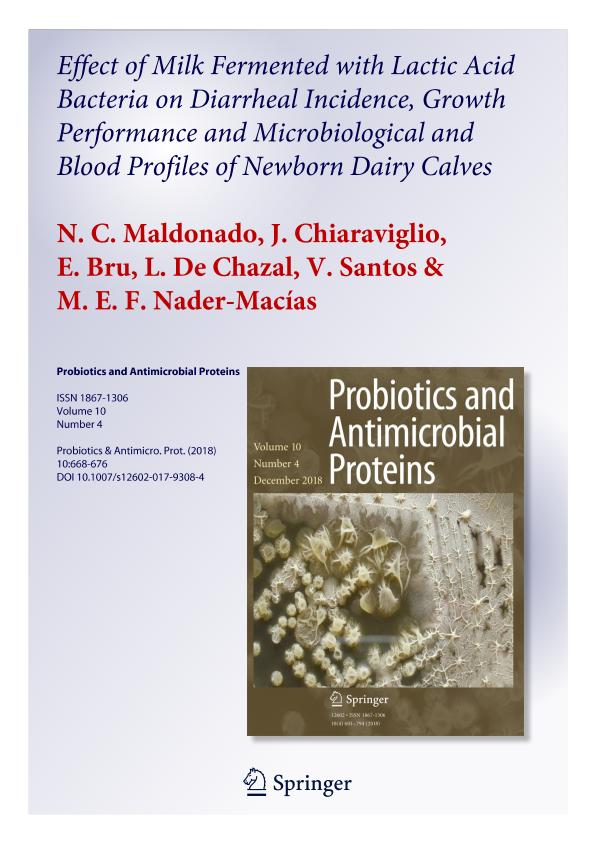Mostrar el registro sencillo del ítem
dc.contributor.author
Maldonado, Natalia Cecilia

dc.contributor.author
Chiaraviglio, José
dc.contributor.author
Bru Chauve, Elena Magdalena

dc.contributor.author
De Chazal, Luis
dc.contributor.author
Santos, Viviana
dc.contributor.author
Nader, Maria Elena Fatima

dc.date.available
2019-08-12T17:04:03Z
dc.date.issued
2018-08
dc.identifier.citation
Maldonado, Natalia Cecilia; Chiaraviglio, José; Bru Chauve, Elena Magdalena; De Chazal, Luis; Santos, Viviana; et al.; Effect of milk fermented with lactic acid bacteria on diarrheal incidence, growth performance and microbiological and blood profiles of newborn dairy calves; Springer; Probiotics & Antimicrob Proteins; 10; 4; 8-2018; 668-676
dc.identifier.issn
1867-1306
dc.identifier.uri
http://hdl.handle.net/11336/81434
dc.description.abstract
The effect of the administration of milk fermented with lactic acid bacteria to calves was evaluated. The strains included were: Lactobacillus murinus CRL1695, Lact. mucosae CRL1696, Lact. johnsonii CRL1693, and Lact. salivarius CRL1702, which were selected for their beneficial and functional properties and isolated from healthy calves in the northwestern region of Argentina. The trial was conducted on a dairy farm located in Tucumán (Holando-Argentino calves). A randomized controlled trial was performed in which 56 new-born animals were divided into two groups: the treated group (T) received the fermented milk for 60 days and the control group (C) only milk. The animals were fed a solid diet ad libitum. The treated group was given a daily dose of 1 × 109CFU of the probiotic fermented milk while the control group was fed milk. Body weight and biometrical parameters were recorded between 15 and 60 days of age, and average daily gain was calculated with three samplings per animal throughout the trial. Rectal swabs and fecal and blood samples were also collected. Results showed the efficacy of the probiotic: lower morbidity and mortality of calves (morbidity was 69.20% in animals without the probiotic, and 46.15% in probiotic-treated animals, with P = 0.09; mortality in C was 34.61 and 7.69% in animals fed with ferment milk; P = 0.02).The calves fed with probiotic evidenced an improvement in nutritional parameters, body condition and weight gain (health index P = 0.01; average daily gain P = 0.03).Viable bacterial numbers showed no differences between the two experimental groups. Hematological parameters and serum proteins were not modified by the treatment. The results suggest that the fermented milk containing lactic acid bacteria can be a viable veterinary product for young calves due to its beneficial effects on health and growth.
dc.format
application/pdf
dc.language.iso
eng
dc.publisher
Springer
dc.rights
info:eu-repo/semantics/openAccess
dc.rights.uri
https://creativecommons.org/licenses/by-nc-sa/2.5/ar/
dc.subject
Beneficial Strains
dc.subject
Calves Management
dc.subject
Fermented Milk
dc.subject
Oral Administration
dc.subject
Probiotic Applications
dc.title
Effect of milk fermented with lactic acid bacteria on diarrheal incidence, growth performance and microbiological and blood profiles of newborn dairy calves
dc.type
info:eu-repo/semantics/article
dc.type
info:ar-repo/semantics/artículo
dc.type
info:eu-repo/semantics/publishedVersion
dc.date.updated
2019-07-24T18:00:37Z
dc.identifier.eissn
1867-1314
dc.journal.volume
10
dc.journal.number
4
dc.journal.pagination
668-676
dc.journal.pais
Estados Unidos

dc.journal.ciudad
New York
dc.description.fil
Fil: Maldonado, Natalia Cecilia. Consejo Nacional de Investigaciones Científicas y Técnicas. Centro Científico Tecnológico Conicet - Tucumán. Centro de Referencia para Lactobacilos; Argentina
dc.description.fil
Fil: Chiaraviglio, José. Provincia de Tucumán. Ministerio de Educación. Instituto de Enseñanza Superior San Pedro de Colalao Anexo Trancas; Argentina
dc.description.fil
Fil: Bru Chauve, Elena Magdalena. Consejo Nacional de Investigaciones Científicas y Técnicas. Centro Científico Tecnológico Conicet - Tucumán. Centro de Referencia para Lactobacilos; Argentina
dc.description.fil
Fil: De Chazal, Luis. Universidad Nacional de Tucumán; Argentina
dc.description.fil
Fil: Santos, Viviana. Universidad Nacional de Tucumán; Argentina
dc.description.fil
Fil: Nader, Maria Elena Fatima. Consejo Nacional de Investigaciones Científicas y Técnicas. Centro Científico Tecnológico Conicet - Tucumán. Centro de Referencia para Lactobacilos; Argentina. Universidad del Norte Santo Tomás de Aquino; Argentina
dc.journal.title
Probiotics & Antimicrob Proteins
dc.relation.alternativeid
info:eu-repo/semantics/altIdentifier/doi/https://dx.doi.org/10.1007/s12602-017-9308-4
dc.relation.alternativeid
info:eu-repo/semantics/altIdentifier/url/https://link.springer.com/article/10.1007%2Fs12602-017-9308-4
Archivos asociados
